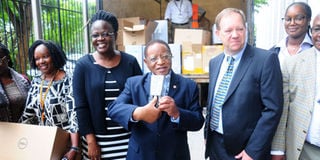Prime
Will paying per day improve civil servants’ productivity?

The head of the Prime Minister’s Implementation Unit, Prof Ezra Suruma (centre) holds a biometric machine donated by the British government this week.
PHOTO BY STEPHEN OTAGE
What you need to know:
Output. Government says civil servants will now be paid for only the days they reported to work in order to ensure service delivery. But workers say reporting to work alone can’t ensure productivity since they need to be motivated first.
On Tuesday, May 22, government announced that it will start paying civil servants according to the number of days one has worked.
This is a new system that is being introduced to substitute the rather traditional way of civil servants being guaranteed monthly salaries irrespective of whether one worked all assigned days or not.
To effect the new plan, Prof Ezra Suruma, the head of the Delivery Unit in the Office of the Prime Minister (OPM), said they will for, the start, instal biometric gadgets at public health and educational institutions to monitor clock-in, clock-out of health workers and teachers.
Prof Suruma said salaries of absentee civil servants will be deducted equivalent to work days missed. The biometric machines will be installed at public facilities in 22 districts in eastern Uganda in a piloting phase and supervisors will be required to file daily reports of their supervisees’ attendance to OPM.
How new system will work
According to OPM, the automated system has been brought in as a pilot in eastern Uganda where a similar but manual system has worked to ensure the efficiency of the civil servants.
“Last week, we were in Jinja for a meeting with district local governments and we were told that some districts no longer pay civil servants who absent themselves from work. We want other districts to follow suit because this is Kisanja Hakuna Mchezo (presidential term for no games),” he said at the launch.
Kaliro, Kayunga, Buvuma, Bulambuli, Bugiri and Bududa districts – all in eastern Uganda – are already implementing the scheme and will be among the biometric machines pilot targets.
But with the machines installed to monitor the arrival and departure of civil servants at their work stations, will this new system translate into improved productivity?
Mr Samuel Ruhweza Kaija, the former Chief Administrative Officer of Bugiri District in whose time the system of monitoring absenteeism of teachers and health workers was started six months ago, says if managed well, it can lead to improved performance.
“I have hope that the biometric machines will add value to the system. We have been using attendance registers and compiled reports to the OPM every regularly. Those found to have been absent are given warning letters, counselled and have as a result worked better,” Mr Ruhweza said.
Precedent
Uganda will be among the first countries in the region to roll out the biometric clock in system for civil servants if the plan goes through.
In December last year, the Rwandan government also ordered all public offices to introduce biometrics to help monitor workers’ attendance, efficiency, productivity and service delivery after its ministry of Public Service and Labour decried laxity in managing attendance and productivity by supervisors and heads of departments.
In Uganda the system is already installed and working is some public institutions such as Parliament and some major health facilities such as referral hospitals. But in the case of Parliament this has not done much to curb absenteeism by lawmakers or improve productivity for that matter.
Mr Danstan Balaba, the Kabarole District CAO and dean of all CAOs, says the use of biometric machines to monitor absenteeism will help end the vice, but wonders whether it will translate into productivity.
“It can lead to attendance to duty. However, I wonder whether it will change the mindset since our civil servants have what they called ‘presenteism’, meaning you come to work and sit until the end of the day,” Mr Balaba said.
He suggests that much as the machines will be deployed, it should remain a collective responsibility by the duty bearers to ensure that teachers have been followed to class and medics are in the wards after clocking in.
Mr Peter Christopher Werikhe, the secretary general of the National Organisation of Trade Unions (Notu), questions whether the same system has been tried and tested to monitor the efficiency of civil servants before being rolled out to other government departments.
Mr Werikhe warns that teachers and medics will not have a problem clocking in and out, but will not be forced to work if they are not motivated financially through better pay.
“Has the OPM used this system and deducted salaries of its officials who are got absent? You transfer a good practice because the reports of clocking-in and out will not determine the productivity. People need to be motivated, let them sort out that first and then do other things,” he says.




